"God has a reason for allowing things to happen. We may never understand His wisdom, but we simply have to trust His will." - Psalm 37:5
The year 2020 has been a challenging year and it carries over this year in 2021 for people all over the world. One area that has been deeply impacted is education. Countries all over the world have been using different approaches so their children can continue to learn. Here in the Philippines, modular distance learning and online classes are used to reach out to children and continue their schooling. One great thing at CSC is our ability to have our classes at the shelter. Our students have greatly benefited and have made substantial improvement in their academic and non-academic skills. We believe continuous learning, even in a modified setting, is an effective way for children to gain the necessary knowledge and skills to satisfy the requirement of their grade levels.
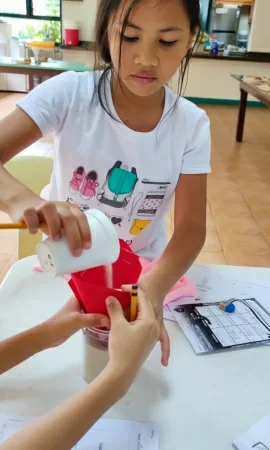
One special student has greatly benefited from a modified class. She started a grade lower when she first came to CSC but because of her determination to learn and handle the lessons presented, we decided to move her up and join a suitable level based on her age and performance. Her first day in August 2020 was full of excitement in learning new lessons and joining a new set of classmates. At first she struggled with the new material especially in reading and spelling. We provided her extra time to work on the skills that needed more attention and refinement. We are thankful that she never losses stamina to keep going in spite of the challenges that come her way. She persevered and is confidently working along with her classmates. She made excellent progress towards the end of the third quarter.
In math, she enjoys solving word problems using the strategies she has learned. She loves math games, especially with math tools available like pattern blocks, pop cubes, and unit blocks. She is also excited to learn simple multiplication and division facts. Her favorite parts of the day; however, are art class and performing experiments during science class. It's wonderful to see how she has progressed this year!
We are so appreciative to all of the supporters, for your faithfulness to CSC in many ways. You are making a difference in the life each child. You have allowed them unlock their potential and show their God-given abilities beyond what we could imagine during this trying time.
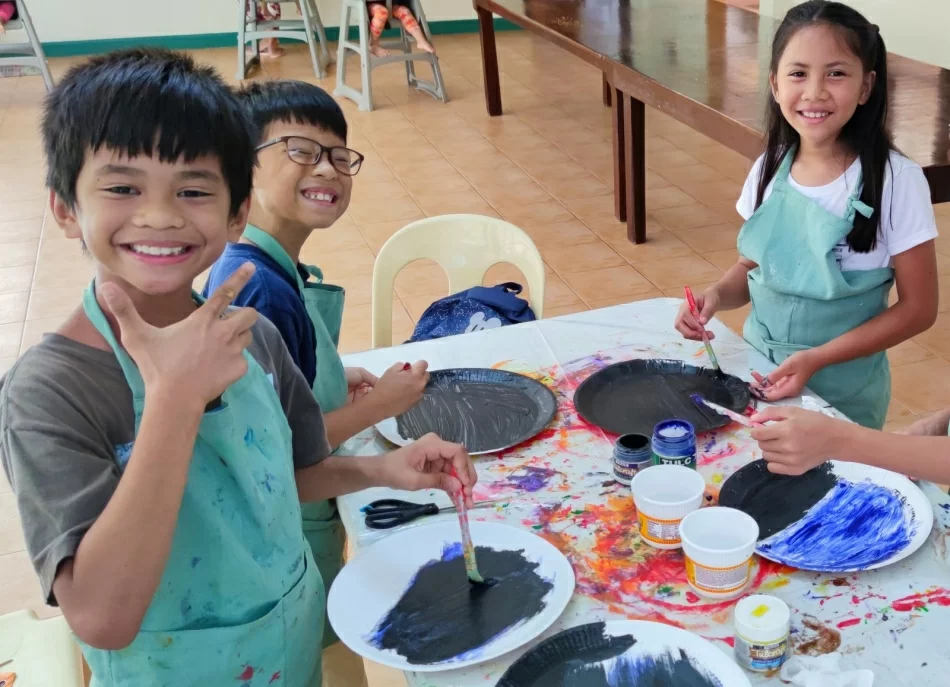
(Note: In order to protect the privacy of the children in our care and to comply with Filipino governmental guidelines, our policy when sharing online is to list either a child's name or their photo but not both.)
Who is the teacher?
Teacher Kristen is new to the CCHS team and we are so glad she is with us. Read on to find out what lesson she learned in her first few weeks on the job.
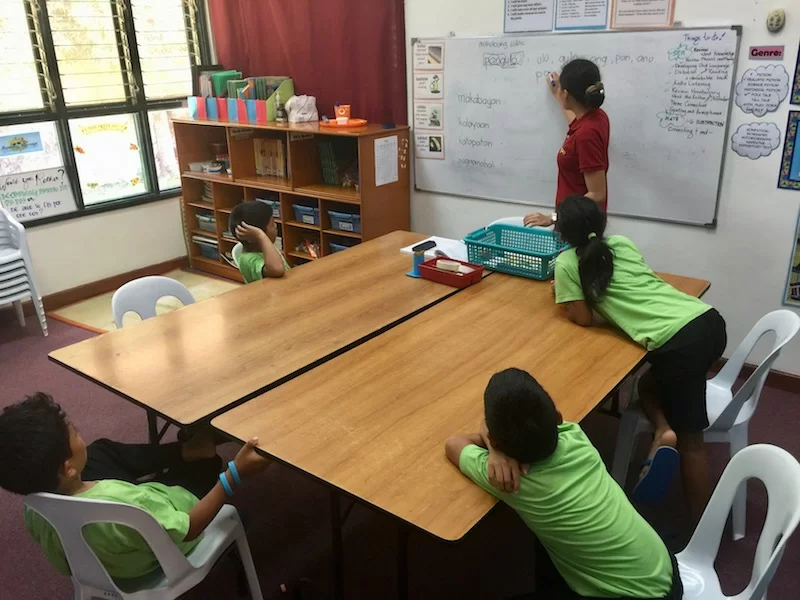
This is my first year ever teaching and I am so glad to be at Cebu Children of Hope School! The things they taught me in college have prepared me for the classroom, but only to a certain point. I've been struggling a bit with new routines and new students. I have tried many of the strategies I learned in college to help students focus in class but they haven't helped much.
I remember when I was a student like them. School was tiring for me as I had to sit most of the day and just listen to the teacher. Not very fun. When I started teaching this year I realized I was doing the same thing my past teachers did, things that made me, as a student, bored. In the first few weeks of school my students at CCHS taught me that I was too idealistic when it came to teaching. They taught me that I needed to cool down and start embracing their unique qualities.
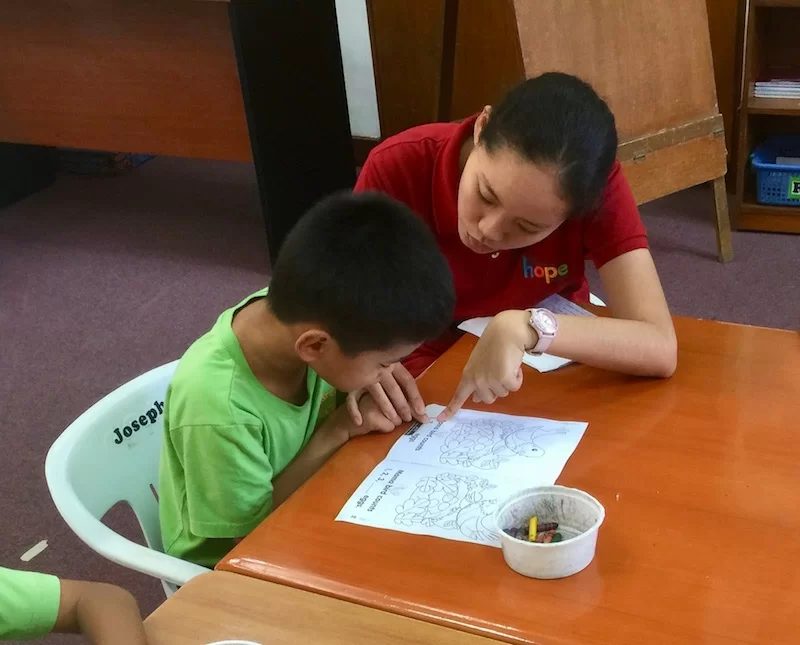
Once I realized this I made some changes in my classroom. I started to really listen to them and smile more. Very quickly I saw changes in their behavior. Now I am having fun teaching them and I love how they respond in class- showing excitement to learn!
Teachers are supposed to be the ones to teach kids. At CCHS I have learned that often kids can be great teachers.
Preschoolers and Plants
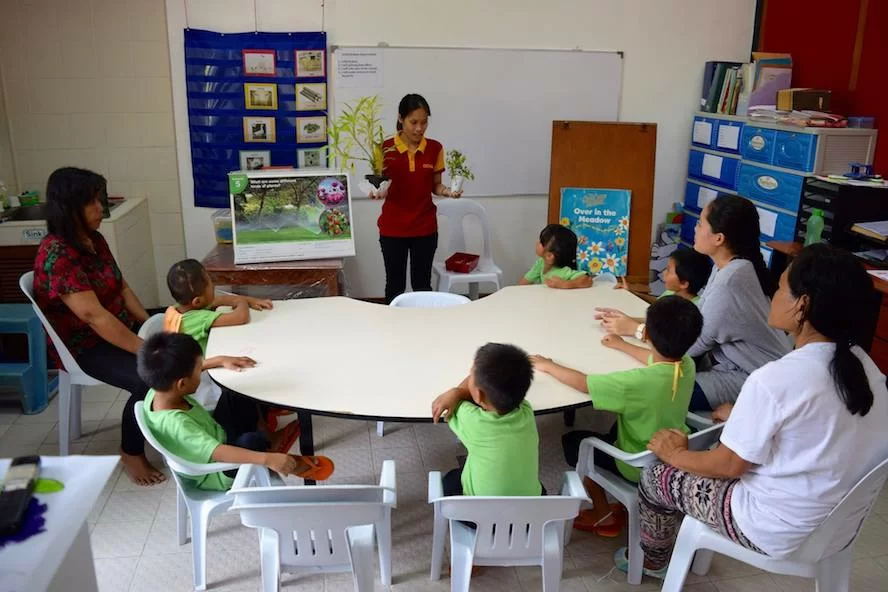
The preschoolers have been learning about the difference between living things and nonliving things. One example of a living thing, which we have been studying a lot about, is a plant. Every time I review with the children they say, "Sige ug balik" (It's a repeat). By the end of the unit the preschoolers were able to identify a plant, tree, shrub, vegetable, and grass. They also learned the parts of the plant (stem, flower, fruit, and roots) and where plants live (in desserts, farms, forests, and gardens).
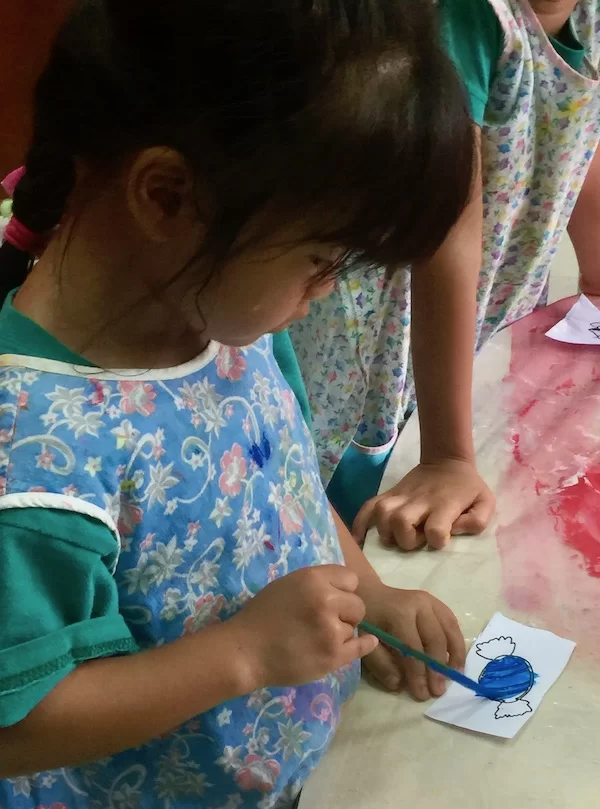 One of my favorite parts of the unit was taking the preschoolers outside for a mini field trip. Our school is surrounded by many different kinds of plants. On our "living things walk" we saw many banana trees, mango trees, and even an avocado tree. The preschoolers loved searching for living things and telling us what they found.
One of my favorite parts of the unit was taking the preschoolers outside for a mini field trip. Our school is surrounded by many different kinds of plants. On our "living things walk" we saw many banana trees, mango trees, and even an avocado tree. The preschoolers loved searching for living things and telling us what they found.
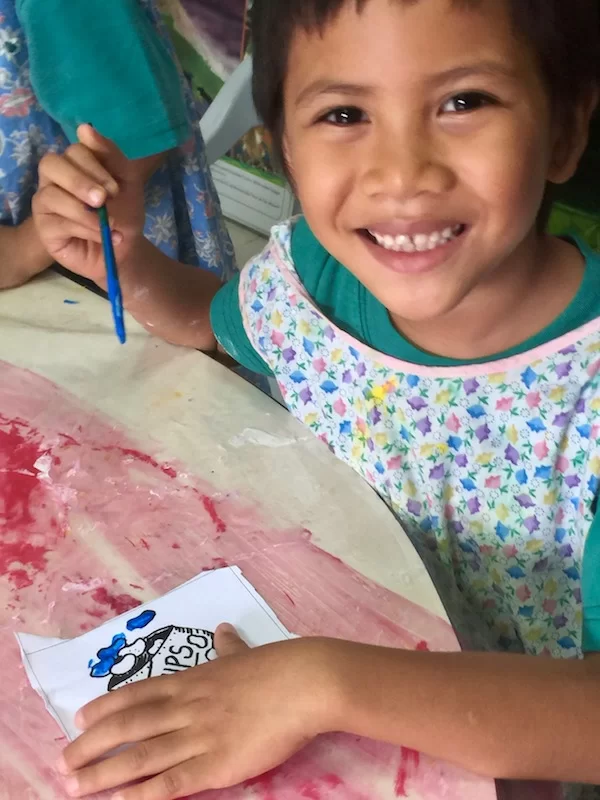
What a joy it was teaching the preschoolers about plants. We had a fun time learning together!
Creative Minds
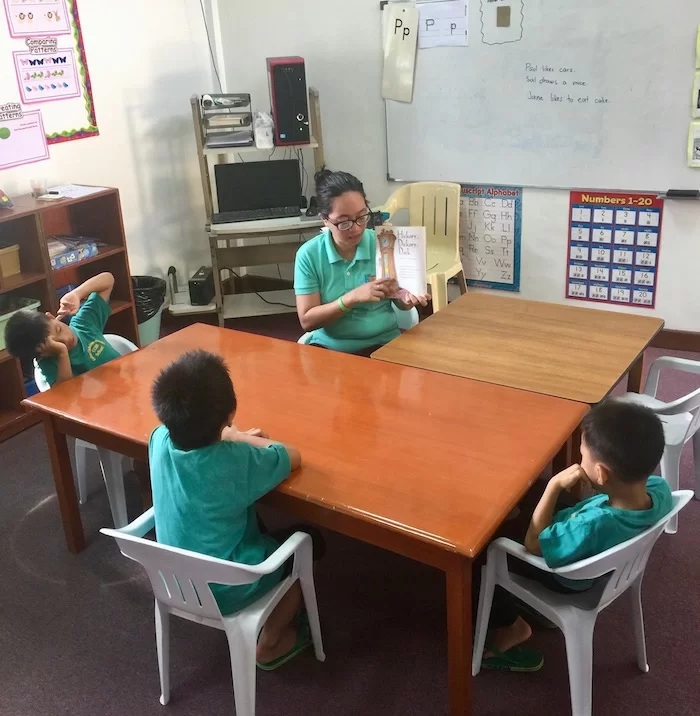
Having conversations with my students helps them learn to interact with their peers and teachers. It has a great impact on their learning and ability to listen as well.
I started this year with just three kids in my classroom. Three kids who love conversation and enjoy sharing their thoughts. One afternoon, during Civics class, one of my students shared with me about one of the CSC aunties (child care workers).
Student 1: Teacher, our auntie just had a baby! (saying it excitedly)
Me: Wow, that's great! Do you know if the baby is a boy or a girl?
Student 1: I don't know.
Student 2: Teacher, I know where the baby comes out.
Me: Where?
Student 2: Here! (referring to his bottom)
Student 1: No Teacher! I heard that a baby comes out from your belly button.
Student 3: Teacher, I know where babies come out of, here in our back.
Student 1: (reacting with a shocked face) No, the baby can't come out of there!
Me: Why?
Student 1: Because our back has a lot of bones. The baby will get hurt!
I love teaching at Cebu Children of Hope School for many reasons. One of them is the creative minds these little children have. You never know what ideas they will share.
Goodbye Up There!
Child welfare types refer to children who become very close while in care at a place like CSC as "institutional siblings." They are not siblings by blood but by affinity. Many of our children experience that kind of relationship while living at CSC. For the younger ones, they don't understand the difference. Such was the case with little Jacob. He had four very good buddies in the Eicher Home nursery. They spent lots of time together eating and playing. They looked out for each other, fought like true siblings and were known to tattle on each other on occasion.
Recently, Jacob was adopted by a great family from Europe. Shortly before Jacob's family came to get him, two of his pals got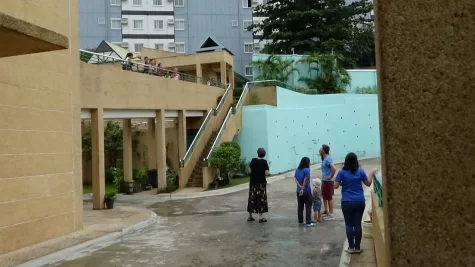 sick and had to be in isolation. Their ailment was very contagious. We worried that Jake, too, would get sick when he was supposed to travel but, thankfully, that didn't happen. But we felt bad that Jake wouldn't be able to say goodbye to his buddies. So Marlys came up with a plan. The infirmary caregivers brought the sick children outside to the bridge and Jake was able to look up, see them and say goodbye. The overhead kids shouted "bye-bye" and it was very touching. Certainly they didn't understand that he was going far away and they might never see him again. But they knew something big was up.
sick and had to be in isolation. Their ailment was very contagious. We worried that Jake, too, would get sick when he was supposed to travel but, thankfully, that didn't happen. But we felt bad that Jake wouldn't be able to say goodbye to his buddies. So Marlys came up with a plan. The infirmary caregivers brought the sick children outside to the bridge and Jake was able to look up, see them and say goodbye. The overhead kids shouted "bye-bye" and it was very touching. Certainly they didn't understand that he was going far away and they might never see him again. But they knew something big was up.
There is lots of love at CSC. Jacob experienced that from house parents, child care workers, staff and the other children. Now he will be feeling the love of a family. And a new sibling that will be his forever.
Science Can Be Funny
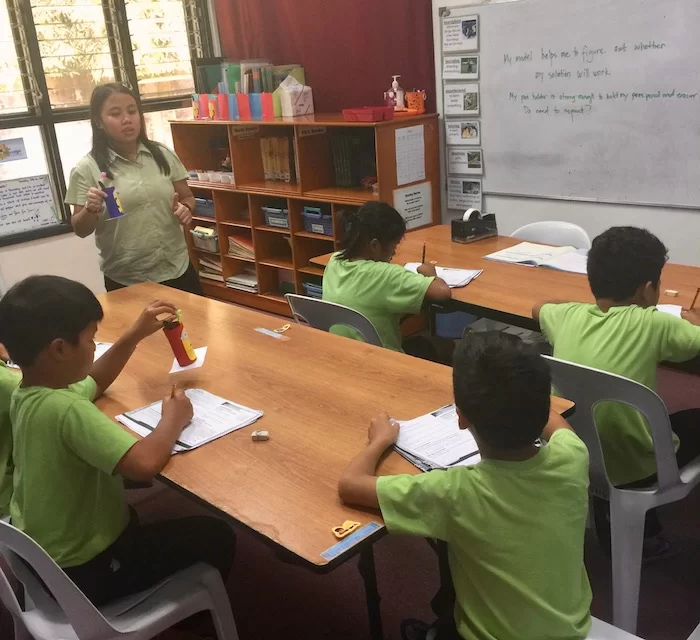
The official school year has begun at CSC! Teacher Lyrah, one of our dedicated and gifted teachers, shared about a science lesson she taught the other day:
Everyone was ready and calm as I stepped into the classroom. The students seemed very excited for the afternoon's discussion entitled "The Scientist and the Science tools."
I asked my students about the science tools and the brainstorming happened like this:
TEACHER: Can you still remember some of the science tools that you learned about last year in your class?
STUDENTS: Yes, Teacher Lyrah!
TEACHER: Tell me about one of those science tools.
STUDENT 1: Teacher, a hand lens.
STUDENT 2: How about a balance?
STUDENT 3: A measuring cup.
STUDENT 4: Thermometer!
TEACHER: WOW! You are really thinking about these tools. What are some others?
I called on one student who hadn't answered yet.
TEACHER: Okay, what is it?
He was very hesitant about his tool and just smiled again.
STUDENT 5: Teacher, how about a telecopter?
He was laughing so hard because he mentioned the tool in a different way. Everyone in the class was puzzled about his answer.
STUDENT 1: What do you mean a telecopter?
Student 5 laughed so hard and kept on saying the word telecopter.
STUDENT 5: (laughing) Teacher, what I mean is a telescope not a telecopter!
TEACHER: A telecopter? That word is a combination of a telescope and a helicopter. Isn't it?
He laughed and said: " Yes, teacher because we use a telescope to see the stars and other flying objects like helicopters."
Then I remembered the time last year when I showed them a telescope and we talked about how it worked.
Everyone in the classroom was amazed with his great new word invention!






